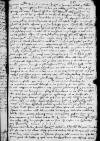Letter #1781
[Ioannes DANTISCUS] to [Samuel MACIEJOWSKI]Löbau (Lubawa), 1537-11-16
English register: Dantiscus is replying to Maciejowski’s letter. He thanks him for his efforts on behalf of Fabian (Wojanowski) and asks him to continue them. The grounds for his faith in their success are that the queen, despite earlier plans to give the canonry to the son of the Pomerania voivode (Rafał Konopacki), is in favor of Wojanowski, while the Cracow bishop (Jan Chojeński) gave Dantiscus hope in his last letter that he would not use the document of Dantiscus’ resignation from the Warmia canonry in favor of Stanisław Hozjusz. Dantiscus informs Maciejowski that he has sent his brother Bernard to Chojeński in connection with this matter, and if Bernard should obtain Chojeński’s consent, he is prepared to send immediately Dantiscus’ document of resignation in favor of Wojanowski to Rome. Dantiscus writes he resigned with great pleasure from the parish in Gołąb in favor of Maciejowski, and in his desire to repay him even more, he is transferring to Maciejowski his income from the parish from this year, to the sum of 100 ducats. He adds that his belief in Maciejowski’s goodwill is based on the recommendation Nipszyc sent him in a letter. Dantiscus asks Maciejowski to inform him if any slander about Dantiscus from his enemies in Malbork should reach the royal court again.
Manuscript sources:
Prints:
| ||||||||
Text & apparatus & commentary Plain text Text & commentary Text & apparatus
Eximie et Venerabilis Domine, frater et amice carissime et honoran(de) or honoran(dissime)⌈honoran(de)honoran(de) or honoran(dissime)⌉. Salutem et omnem felicitatem.
Ex amicissimis cf.
Ex centum aureis Hungar(icalibus), quos mihi
Quod Dominatio Vestra accessioni et translationi meae congratulatur, facit id quidem pro sua virtute et summa erga me humanitate, cumque de benevolentiae in me affectu adeo certus sum, quod nihil mihi possit esse exploratius, ab ea summopere peto, ut si quid ex
Quod reliquum est, Dominacionem Vestram quam diutissime bene valere, illique omnia fausta opto ac precor.
Ex

 BCz, 244, p. 287
BCz, 244, p. 287